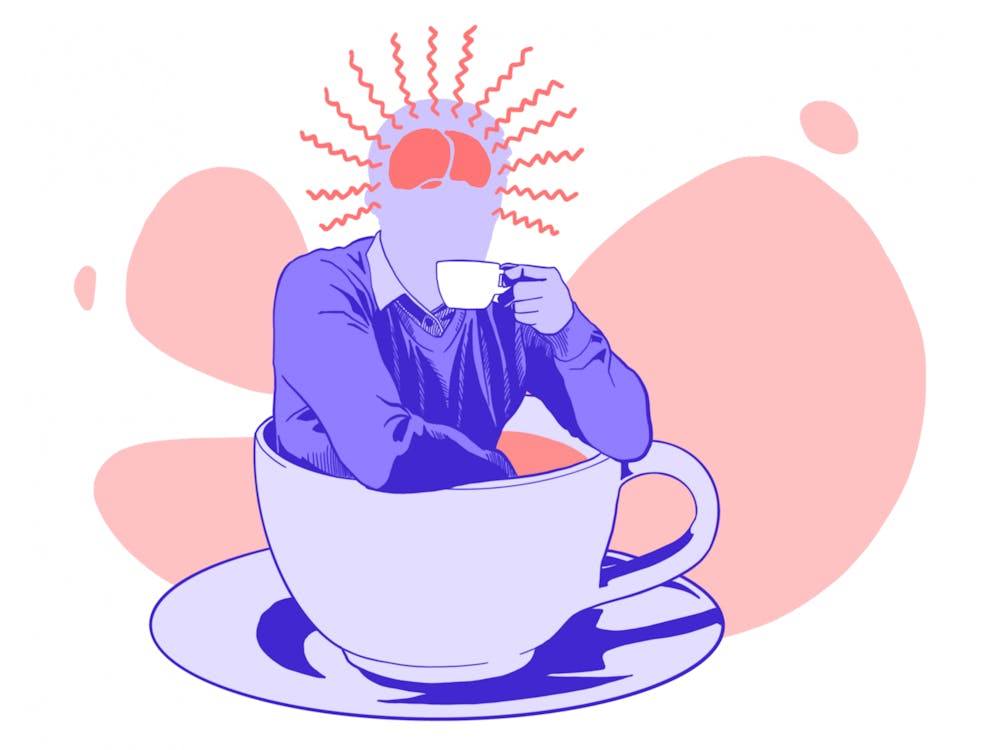When I was a kid, I watched my dad drink coffee every day before work. He’d turn on the Keurig and fill the little side compartment up with water. Steaming black coffee would dribble out of the machine.
I don’t remember the first time I tried coffee, but I do know that I absolutely hated it.
Throughout high school, I’d watch my friends come into first period with a new Starbucks drink each day. Iced Americanos and pumpkin spice lattes suddenly replaced two percent milk cartons at lunch. But making this switch had never appealed to me. I’d bring water. I never understood how anyone could withstand the taste of coffee enough to enjoy the benefits of being hyper awake that early in the morning.
Looking back now, getting a coffee in the morning would probably have saved my butt from falling asleep in class a couple of times. Still, at the time, I’d made my stance clear. I was the coffee hater.
Everything changed when I came to Penn.
Even though I was waking up much later in the day, studying became a lot harder. I had never really had to try much in middle or high school—I’d remember things and that’d be it. Deep into my first semester of college, though, I realized that wouldn’t cut it. I had far too many readings and problem sets to finish, and yet, after a few problems, I would get distracted. I needed a solution.
I just didn’t realize that solution had been sitting in front of me the whole time.
I went from hating coffee to becoming nearly dependent on it during midterm season. Without the drink, I’d barely be able to get through a stack of biology flashcards or type up an essay for my politics class. Each week, I’d find new coffee shops and make it a treat prior to studying. The taste of a latte or cold brew excited something inside me, giving me the motivation to leave my dorm and pull out my textbooks. Studying was no longer a chore, but something that I could use as an excuse to buy coffee.
I'll admit that I didn’t love the taste at first, but if I added enough sugar and milk, I could ignore the bitterness. Over time, my brain started to enjoy it anyway. It made me feel alert and ready to take on the world.
I remained semi–dependent on coffee for a while. Occasionally, I’d cut back to save money or take a break when my workload was lighter. I’d even find at–home alternatives since $5 tall lattes at Starbucks took a large toll on my wallet. But it was never that difficult to jump right back into drinking it frequently. My first job caused my addiction to re–ignite. Then, when the school year started, I took a break until midterm season came around again.
Things changed for the worse around the time that quarantine started. My depression and anxiety only increased as I was forced to stay inside and find things to do, all while feeling terrified that my parents would die. While I’d always struggled with some form of anxiety, COVID–19 exacerbated these issues. I quickly developed panic disorder and experienced frequent panic attacks, sometimes nearly every day of the week. They’d range from struggling to breathe to throwing up and almost passing out on my bathroom floor.
Eventually, my brain put two and two together and realized that the days when I drank coffee were also the days I was most susceptible to these panic attacks. Logically, this made sense. Caffeine imitates symptoms of anxiety like jitters, nervousness, and fast heartbeat. Studies have shown that people with anxiety who consume caffeine are more likely to experience panic attacks.
So I stopped drinking coffee. Actually, I became terrified of drinking it. I’d avoid the beverage at all costs. Even if I was in dire need of a boost, I’d refuse in fear of a panic attack. While this seemed like a better option, it really wasn’t. This avoidance only became another manifestation of my anxiety.
I started going to therapy for my panic attacks in August. One of the first things my therapist mentioned was exposure therapy—I would need to force myself into uncomfortable situations so I could get over them. At the top of that list: drinking coffee.
I went from hating coffee, to drinking it for fun, to being terrified of it, to now forcing myself to drink it just to get over my intense fear. The first couple of times, I started slow. I’d get half caffeine at Starbucks. I’d get smaller cups. Eventually, I moved onto larger cups and more frequent visits to coffee shops.
Now I’ve almost entirely gotten over my fear of iced lattes. Yes, there are still days when I have panic attacks, and my instinct is to attribute it to whatever’s in my Saxby’s cup. But then I remind myself that coffee has also been helpful. It’s gotten me through difficult study sessions. It’s given me the motivation to finish articles. It’s pushed me to get work done and better myself. Coffee has harmed me, but it’s almost made me stronger. I’m just not sure how to negotiate the two.

